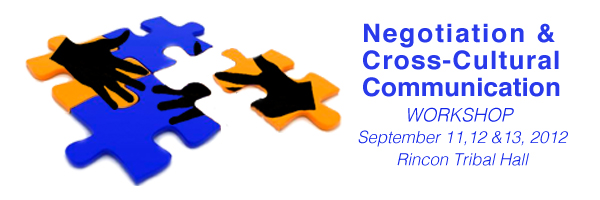
|
| Greetings! It’s one week till IDRS’ dynamic workshop, Negotiation & Cross-Cultural Communication, comes to the Rincon Tribal Hall in Valley Center, CA. There are still a few seats available so we encourage you to register to now. Instead of just giving people information, our emphasis is on ensuring that people leave our training with new skills that can be applied in every aspect of their lives. Our workshops teach people how to: reach across cultural, racial, and gender boundaries; create an atmosphere of mutual respect and trust; prepare for and run orderly meetings that produce results; identify “ground rules” that create a sense of safety and support informed decision-making; deal with difficult people and people with difficulties; surface and resolve differences in an orderly way; and assist people reach agreements that satisfy mutual interests and are fair, enforceable and lasting. If you possibly have the opportunity, please join us. Your career and organization will thank you! To learn more about the training or to register CLICK HERE! For more information about scholarships, groups discounts, or any other questions, please give us a call at 916-482-5800 or e-mail us at info@idrsinc.org. |
| To Register Click Here |
| Forward this message to a friend |
| To find out more about Indian Dispute Resolution Services (IDRS), visit our homepage @ www.idrsinc.org. |
| Click to view this email in a browser |
| IDRS, Inc. 1325 Howe Ave. Suite 201 Sacramento, California 95825 US |



Young teens and adults on many reservations have no guidance on proper life skills due to a poverished environment. Adolescent children see abuse, drugs, alcohol and crime in multi-generations and are looking for a way out. In our family, my wife had a teenage niece who committed suicide (by triggering a shotgun at close range) one year after giving her high school valedictorian speech. My wife is 31 and has also seen cousins, and friends die because of alcohol and drugs. One year before her cousin committed suicide; a close friend passed away in our home at 27 years old from excessive eating, drinking, drug abuse, and prescription medication. This was all treatable and tied to depression. She asked us for help, and we tried, but it was apparently too late and her body could take no more, and she died in her sleep. According to the National Institute of Mental Health a 2007 a census shows that American Indian and Alaska Natives suicide rates were the highest of all nationalities at 14.3 per 100,000, and it is only getting higher. My wife and I, this year started an organization called Native Cry Outreach Alliance (http://www.facebook.com/nativecry) and are looking forward to creating a physical environment where young Warriors can develop positive coping mechanisms. We are hoping to abolish suicide and slow death rates among these children. We are not alone; most reservations are developing similar types of organizations to stop their children from dying also. Please help us by signing this petition to Congress and help get this bill passed. Here is a link to the bill - http://hdl.loc.gov/loc.uscongress/legislation.112hr4467
WASHINGTON – Pat Rogers, a Republican National Committee (RNC) leader, is facing calls for his dismissal after telling the staff of Gov. Susana Martinez, R-N.M., that because she agreed to meet with American Indians, she disrespected the memory of Col. George Armstrong Custer.
Custer is infamous for being a U.S. Army commander in the mid-1800s who killed many American Indians during what are historically known as the Indian Wars. He was killed at the Battle of the Little Bighorn in 1876.
Read more:Newswise — DENVER — New research indicates that urban American Indian youth who follow American Indian traditional spiritual beliefs are less likely to use drugs and alcohol. Arizona State University social scientists will present their findings at the 107th Annual Meeting of the American Sociological Association.
The study, “Spirituality and Religion: Intertwined Protective Factors for Substance Use Among Urban American Indian Youth,” was recently published in The American Journal of Drug and Alcohol Abuse. The authors are: Stephen Kulis, the study’s principal investigator and ASU School of Social and Family Dynamics professor; David R. Hodge, ASU School of Social Work associate professor; Stephanie L. Ayers, ASU Southwest Interdisciplinary Research Center associate director of research; Eddie F. Brown, ASU American Indian Studies professor and American Indian Policy Institute executive director; and Flavio F. Marsiglia, ASU School of Social Work professor.
Full story at: http://bit.ly/P1DOT6
California's Lost Tribes. ... By Stephen Magagnini
SACRAMENTO BEE, July 1, 1997,
Open positions:
Elementary school teacher
Librarian
Maintenance infrastructure coordinator
Custodian
For more information please see:
http://www.yochadehe.org/employment